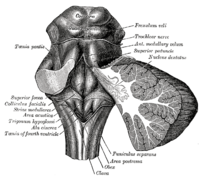
Bowman‐Birk inhibitor modifies transcription of autophagy and apoptosis genes in an in vitro model of Alzheimer's disorder
Sign Up to like & getrecommendations! Published in 2019 at "Journal of Cellular Biochemistry"
DOI: 10.1002/jcb.28391
Abstract: Alzheimer, a current neurodegenerative disorder has adverse effects on memory and behavior. β‐Amyloid peptide accumulations are the hallmarks of Alzheimer. Dysfunction of autophagy and apoptosis is detected in Alzheimer's disease. The effect of Bowman‐Birk inhibitor… read more here.
Keywords: autophagy apoptosis; model alzheimer; vitro model; birk inhibitor ... See more keywords

Longitudinal assessment of cerebral perfusion and vascular response to hypoventilation in a bigenic mouse model of Alzheimer's disease with amyloid and tau pathology
Sign Up to like & getrecommendations! Published in 2019 at "NMR in Biomedicine"
DOI: 10.1002/nbm.4037
Abstract: Alzheimer's disease is the most common neurodegenerative disease, and many patients also present with vascular dysfunction. In this study, we aimed to assess cerebral blood flow (CBF) and cerebrovascular response (CVR) as early, pre‐symptomatic (3… read more here.
Keywords: model alzheimer; perfusion; alzheimer disease; disease ... See more keywords

Neuroprotective properties of solanum leaves in transgenic Drosophila melanogaster model of Alzheimer's disease
Sign Up to like & getrecommendations! Published in 2022 at "Biomarkers"
DOI: 10.1080/1354750x.2022.2077446
Abstract: Abstract Introduction We investigated the effect of African eggplant (AE) (Solanum macrocarpon L) and Black nightshade (BN) (Solanum nigrum L) leaves; two tropical vegetables consumed by humans on behavioural, biochemical and histological indices in Drosophila… read more here.
Keywords: model alzheimer; alzheimer disease; neuroprotective properties; melanogaster model ... See more keywords

Electrophysiological alterations of the Purkinje cells and deep cerebellar neurons in a mouse model of Alzheimer disease (electrophysiology on cerebellum of AD mice)
Sign Up to like & getrecommendations! Published in 2022 at "European Journal of Neuroscience"
DOI: 10.1111/ejn.15621
Abstract: Alzheimer's disease is histopathologically well defined by the presence of amyloid deposits and tau‐related neurofibrillary tangles in crucial regions of the brain. Interest is growing in revealing and determining possible pathological markers also in the… read more here.
Keywords: model alzheimer; electrophysiological alterations; disease; alzheimer disease ... See more keywords

URMC-099 facilitates amyloid-β clearance in a murine model of Alzheimer’s disease
Sign Up to like & getrecommendations! Published in 2018 at "Journal of Neuroinflammation"
DOI: 10.1186/s12974-018-1172-y
Abstract: BackgroundThe mixed lineage kinase type 3 inhibitor URMC-099 facilitates amyloid-beta (Aβ) clearance and degradation in cultured murine microglia. One putative mechanism is an effect of URMC-099 on Aβ uptake and degradation. As URMC-099 promotes endolysosomal protein… read more here.
Keywords: model alzheimer; urmc 099; facilitates amyloid; 099 facilitates ... See more keywords

Meridianins Rescue Cognitive Deficits, Spine Density and Neuroinflammation in the 5xFAD Model of Alzheimer’s Disease
Sign Up to like & getrecommendations! Published in 2022 at "Frontiers in Pharmacology"
DOI: 10.3389/fphar.2022.791666
Abstract: Glycogen synthase kinase 3β (GSK3β) is a core protein, with a relevant role in many neurodegenerative disorders including Alzheimer’s disease. The enzyme has been largely studied as a potential therapeutic target for several neurological diseases.… read more here.
Keywords: model alzheimer; disease; alzheimer disease; meridianins rescue ... See more keywords

5-Methyltetrahydrofolate Alleviates Memory Impairment in a Rat Model of Alzheimer’s Disease Induced by D-Galactose and Aluminum Chloride
Sign Up to like & getrecommendations! Published in 2022 at "International Journal of Environmental Research and Public Health"
DOI: 10.3390/ijerph192416426
Abstract: The effects of 5-methyltetrahydrofolate (5-MTHF) on a rat model of Alzheimer’s disease (AD) induced by D-galactose (D-gal) and aluminum chloride (AlCl3) were investigated. Wistar rats were given an i.p. injection of 60 mg/kg D-gal and… read more here.
Keywords: model alzheimer; rat; alzheimer disease; disease induced ... See more keywords

Revisiting the Radiosynthesis of [18F]FPEB and Preliminary PET Imaging in a Mouse Model of Alzheimer’s Disease
Sign Up to like & getrecommendations! Published in 2020 at "Molecules"
DOI: 10.3390/molecules25040982
Abstract: [18F]FPEB is a positron emission tomography (PET) radiopharmaceutical used for imaging the abundance and distribution of mGluR5 in the central nervous system (CNS). Efficient radiolabeling of the aromatic ring of [18F]FPEB has been an ongoing… read more here.
Keywords: 18f fpeb; model alzheimer; alzheimer disease; preliminary pet ... See more keywords

Lamotrigine protects against cognitive deficits, synapse and nerve cell damage, and hallmark neuropathologies in a mouse model of Alzheimer’s disease
Sign Up to like & getrecommendations! Published in 2022 at "Neural Regeneration Research"
DOI: 10.4103/1673-5374.343888
Abstract: Lamotrigine (LTG) is a widely used drug for the treatment of epilepsy. Emerging clinical evidence suggests that LTG may improve cognitive function in patients with Alzheimer's disease. However, the underlying molecular mechanisms remain unclear. In… read more here.
Keywords: cell damage; model alzheimer; disease; alzheimer disease ... See more keywords